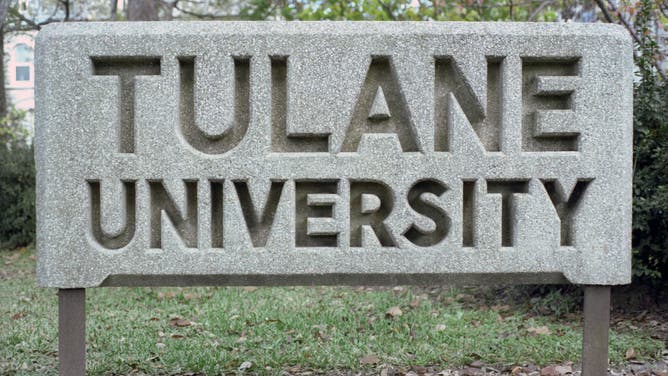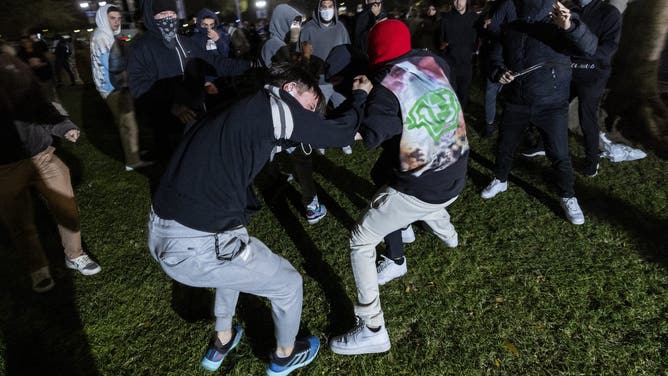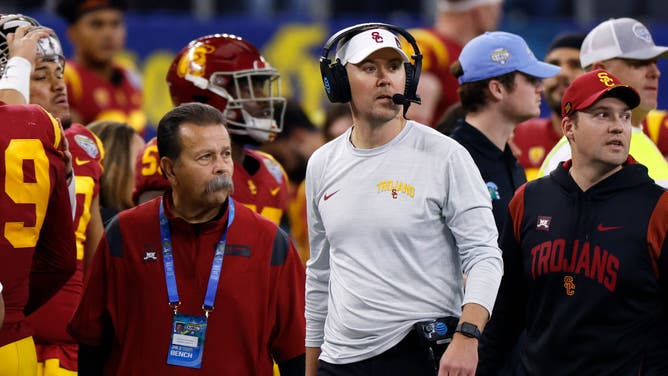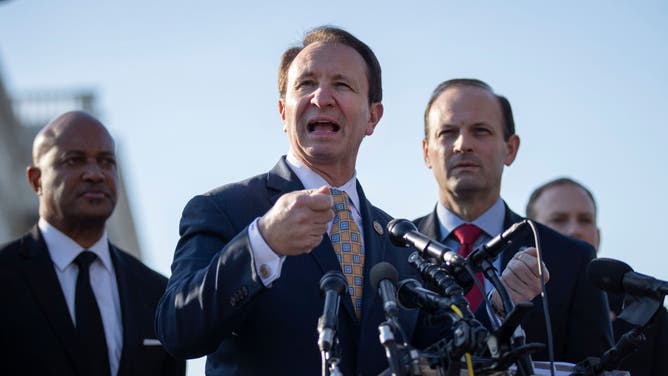Tulane, Alabama, Florida Use Finesse To Better Handle Campus Protests That Plague UCLA, Columbia
NEW ORLEANS - It was quiet Thursday morning at Tulane University, a private university of 14,000 students nestled off the picturesque, oak tree- and streetcar-lined St. Charles Avenue in the heart of uptown.
"Yeah, everything is back to normal," an undergrad told OutKick. "I was over by St. Charles this morning, and the whole encampment and everything (tents, makeshift barriers of wood, tires and umbrellas) have been cleared out."
Classes for the semester ended Wednesday with final exams beginning Saturday. But that's only part of the reason why things were quiet. The New Orleans Jazz & Heritage Festival opened its second weekend this morning at the Fair Grounds racetrack with the Rolling Stones set to play from 5-7 p.m. local time for the first time in the 53 years of the Fest.
But that's only part of it, too.

Tulane is a private school in uptown New Orleans that opened in 1834. (Getty Images).
A major, riotous pro-Palestinian and antisemitic protest over the Palestine-Israel war was skillfully averted on Wednesday by the well organized units of the Louisiana State Police - equipped with intimidating SWAT trucks and tactical gear - the New Orleans Police Department, and Tulane's campus police.
Tulane's enrollment has long been filled with students from the East Coast who couldn't quite get into Ivy League schools. But it is also 40 percent Jewish - the largest Jewish enrollment of any non-Jewish university in the country, according to the university.

A pro-Palestinian demonstrator is beaten by counter protesters attacking a pro-Palestinian encampment at UCLA on Wednesday. (Getty Images)
So, the authorities had good reason to be particularly ready for antisemitic hate. And they didn't sit and let a small group of protesters - the majority of whom were not even students, as is often the case - dominate the school, which is what happened at overly protest-lenient UCLA and Columbia University on the other coast in New York City. There were hundreds of arrests at those two schools with violence on both sides. Protesters at UCLA hurled objects at police.
Tulane And Loyola Warned Students
Tulane officials allowed the protests and encampment on Monday and Tuesday, but only to a degree at arms' length and with expert controlled finesse. Tulane warned students through a mass email that it was "focused on containing and ending the protest" and warned students who joined in that they could be arrested.
Loyola University, located next door to Tulane, also warned students.
"If you are arrested during this demonstration, Loyola has no power to intervene in legal proceedings," Loyola president Xavier Cole told students. "You will be in violation of the student code of conduct and may face additional consequences."
Tulane Police erected barricades - more often used for Mardi Gras parades - to block protesters' movement through campus and placed large, electronic, "No Trespassing" signs. They piped in loud pop music that successfully drowned out various chants, such as, "Resistance Is Justified While Palestine Is Occupied!"
Tulane suspended several students as well as the school's chapter of Students for a Democratic Society for its role in the protests. There were some arrests. But students were allowed to protest.

USC coach Lincoln Riley and staff look worried late in their game against Tulane in the Cotton Bowl on Jan. 2, 2023, that the Green Wave won. (Getty Images)
Then the heat moved in at pre-dawn Wednesday with as much precision and efficiency as the Green Wave football team showcased in upsetting USC, 46-45, in the Cotton Bowl on Jan. 2, 2023.
After warnings, dozens of State Police, New Orleans Police and Tulane Police in helmets, gas masks and body armor and armed with weapons moved in at 3 a.m. Wednesday - when many students were asleep or out partying at The Boot on Broadway Street or other haunts. Police pushed protesters off a campus lawn and ordered those gathering on the neutral ground (median) on St. Charles Avenue to disperse. A total of 14 were arrested or detained. Only two were actual Tulane students. Four were students from Loyola.
By daylight, there were few signs of a protest. It was over with minimal arrests and no injuries after hundreds of arrests at UCLA and Columbia with much more violence toward the authorities.
Tulane's Anti-Protest Strategy Was Well Planned
"Today's action was carefully planned and coordinated over the past few days with the goal of keeping the protesters and our community safe while returning our campus to normal operations," Tulane president Michael Fitts said in a statement. "Free speech and the freedom to protest are sacred to us."
Tulane has previously authorized other demonstrations this year.
"But harassment, intimidation, violence and other criminal acts on any of our campuses are not acceptable," Fitts said. "Organizers of protests need to know we will not tolerate these things."
Tulane officials added that most of the 200 people in the encampment at its height were not Tulane for Loyola students, faculty or staff.
"We know our students well and can easily distinguish between them and outside protesters," a Tulane spokesman said.
Protesters, though, said that the SWAT team and the weaponry were a little much for an unarmed encampment. Maybe, but fear can be a discouragement.
The "weapons" were also "less lethal devices," a State Police spokesman said. There was no tear gas or chemical ammunition.
"These troopers are highly trained in handling such situations and have distinct roles and responsibilities," the spokesman said. "The safety of the community and law enforcement personnel is of utmost importance."

Louisiana Governor Jeff Landry is proud that protests at Tulane in New Orleans did not get out of hand as they did on the coasts at UCLA and at Columbia University in New York City. (Getty Images)
The strategy worked.
"Many colleges across our country may allow this lawlessness, but Louisiana will not," Louisiana Governor Jeff Landry said Wednesday. "This state will not tolerate those who seek to disturb the peace by means of criminality."
Now, Tulane students can study for exams in peace while protected.
"They still have huge fences and barricades keeping anyone from getting on the lawn," the Tulane student said Thursday morning. "There's still a campus police presence."
But a quiet one.
It's quiet at the University of Alabama and the University of Florida now, too, after brief protests that were also averted previously this week.
At Alabama, a group of students chose chants of "USA … USA … USA" over the pop music used at Tulane, and that worked too, as the chants drowned out the pro-Palestinian chants.
"To the credit of everyone at the University of Alabama, the situation wasn't unruly and definitely not like anything people have seen at UCLA or Columbia," OutKick's Dave Hookstead wrote Thursday. "I guess people are just more respectful of the rule of law in the SEC."
And Tulane was a charter member of the SEC in 1933 before leaving after the 1965 season.
Florida associate vice-president of communications Steve Orlando put some less sincere student protesters at Florida and those professional, traveling protesters suddenly on the scene in Gainesville in their place better than anyone.
"This is not complicated," he said in a university statement on Monday. "The University of Florida is not a daycare, and we do not treat protesters like children. They knew the rules. They broke the rules. And they’ll face the consequences. For many days, we have patiently told protesters - many of whom are outside agitators - that they were able to exercise their right to free speech and free assembly. And we also told them that clearly prohibited activities would result in a trespassing order from all university properties for three years and interim suspension from the university. For days, we patiently and consistently reiterated the rules. Today, individuals who refused to comply were arrested after multiple warnings and multiple opportunities to comply."
Orlando's statement should be in every college and university handbook across the country and posted near prime campus protest real estate everywhere.
But to some less serious and committed to the cause, it will always be cool to protest in college. It's part of the scene - like football games and keg parties - if convenient.
"We can still mobilize whenever we want," a Tulane graduate student told WWNO radio in New Orleans outside the Orleans Parish Sheriff's Office late Wednesday, while her fellow students were jailed or detained. "There will be another semester."
You know, after Jazz Fest and summer break.